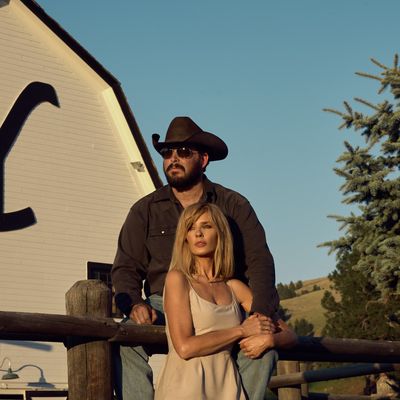
The best thing that I can say about the series (?) finale of Yellowstone is that it’s bad in a comfortable, predictable way, rather than bad in a way that makes you feel like you’re going insane. Sure, there’s one last bit of Taylor Sheridan self-gratification in the first ten minutes, as everyone gathers around and laughs heartily at one last wacky story from Travis. But there’s nothing as brain-breaking as last week’s extended Travis segment. Then again… you ideally want to feel something when you’re watching the (most likely) last episode of a show, don’t you?
“Life Is a Promise” front-loads most of the closure for the supporting and main characters, awkwardly putting off the Jamie story (the one actual exciting thing going on) entirely for the first half. So let’s go through their post-ranch plans rapid-fire, starting with the cowboys: Teeter will work for Travis, Jake and Ethan will work for an outfit in New Mexico, Lloyd will work in West Yellowstone, Walker will join Laramie on the rodeo circuit, and Ryan will “wander.” (We later see him reconnect with Abby after a whole Lainey Wilson performance, so he’ll be joining her on the road just like Walker.)
Most of these seem about right for the individual characters — like Lloyd, who can’t bear to leave the region where he spent his whole life. I don’t love that Teeter is stuck working for a prick (not to mention an author self-insert), but there’s some resonance to the idea that she needs to get away from all those happy but painful memories of Colby, and at least Jimmy has a friend. I also don’t have many feelings about Abby, but it makes sense that Colby’s death would drive his best friend to think more deeply about how much time he’s been wasting by prioritizing the ranch life over everything, including a potentially life-changing relationship.
By the way, remember that pipeline project that Chief Rainwater and Mo show up to discuss for a few minutes every so often? Rest assured, all the materials involved are now at the bottom of the reservation’s drinking water reservoir (that can’t be good for the water, can it?), and there weren’t any cameras to catch Mo and his many co-conspirators. Rainwater knows that this won’t go ignored, but he also seems pretty sure that it can only be good for the tribe, who will push back and keep the conversation going themselves. Okay!
But the biggest win for the Broken Rock Reservation in this final chapter is what we all suspected last week: Kayce will sell the ranch for dirt-cheap ($1.25 an acre, which comes out to $1.1 million altogether), asking only that he and his family be allowed to stay in their humble home at East Camp — and that Rainwater never sell or develop the land here. Rainwater basically says, “What? I would never develop the Yellowstone!” even though he once seemed pretty interested in partnering with Market Equities; this show never really decided whether Rainwater was a good guy or a bad guy or an antihero, but here he does the right thing, passionate about treating the land as sacred.
Setting aside all realism and viewing Kayce’s tax evasion idea generously, this is a fitting enough end for both the ranch itself and Kayce. His series-long family-versus-ranch internal conflict is finally over, symbolized by one last vision of the friendly wolf digging a den, and he gets to teach his son the ropes like he always wanted. (Tate is going to grow up even more antisocial than Carter.)
John’s funeral serves as a kind of sendoff to the ranch, and it’s a bit sappy and long-winded, basically what you’d expect for a private John Dutton funeral. There’s nothing wrong with a scene like this, really, but there’s a weird lack of specificity to it outside Lynelle Perry’s comment about wearing her tightest skirt today for John. Even Rip, who had possibly the closest relationship with John throughout the show, doesn’t have anything much to say besides the usual assurance that he’ll take care of John’s daughter. But John was much more to Rip than just his father-in-law. The opening “thank you” acknowledges that a little, but I wanted more. I know that Rip is a man of few words, but this is the finale! Aren’t we owed a little catharsis, a little real emotion outside Beth’s usual drinking and angry sobbing?
Beth can barely stomach the funeral, so she kicks her revenge plans into high gear, whispering “I will avenge you” to her dad’s coffin and then taking off to murder her brother. When we see Jamie, he’s laughably unconcerned, convinced that his speech went well and nobody will ever question his role in John’s death again. But his terrifying sister appears in the mirror with a knife and a tire iron like some horror-movie demon, and finally the two have the knock-down, drag-out fight we’ve been waiting for.
When he gets the upper hand, Jamie really lays into Beth — we’ve seen this woman get beaten and injured a lot, haven’t we? — to the point that it’s impossible to have any empathy for him. Still, as much as I smirked watching Jamie pour spoiled milk into his pepper-sprayed eyes before getting stabbed in the foot and eventually stabbed in the heart, it’s hard for me to truly appreciate Beth’s triumph the way the show wants me to. Jamie is a pathetic weasel, but he’s also perpetually on the bottom even when he’s superficially on top. At a certain point in the show, I started wanting him to get at least one win against Beth, just because he was so consistently powerless against her attacks, and because she never faced any consequences for her own actions. Seeing him actually almost beat and choke her to death isn’t exactly satisfying, but in a way it’s the first time he’s really fought back against her. It’s a shame the show’s most serious and long-lasting rivalry stayed so static for so long, because Beth’s win here feels a little hollow.
In any case, she gets everything she wants: She avenges her father and assigns Rip and Lloyd to one last drop-off at the train station for old times’ sake. She points Dillard in the right direction, suggesting some ways to track down John’s killers through Sarah Atwood’s wire transfers, and her accomplices burn Jamie’s truck to make it look like evidence he wanted gone. Beth is a happy camper in the hospital, immediately going for some purse vodka while watching the news report about the aggravated assault and domestic violence charges against her very much deceased brother. She doesn’t even need oxycodone for those broken ribs! What a badass.
It’s striking to see the disassembly of the ranch house in these ending scenes, and Rainwater’s emotional reaction to the proceedings made me feel something, unlike so much of this finale. The melancholy voiceover from Elsa Dutton (Isabel May) from 1883 is a nice touch, too, a monologue about the suffering people go through to maintain their control and exploitation of land.
Still, despite the occasional times I find myself agreeing with Sheridan’s philosophies about land or government or corporations or gentrification or the world, I can never shake the feeling that he doesn’t really get it. And as his writing has gotten weaker in these last few seasons — as he has stretched himself thinner and thinner, pursuing other projects while letting this one fall behind to the point that it lost its star and the single reason so many people originally tuned in — that ignorance has come out more and more.
That’s still the case here. I can accept that Kayce and his family will be happy at their little place on the ranch, and that Beth and Rip will live a blissful life on a remote farm where there’s no chance of even running into a tourist — although, I’m not really sure I can, because we saw just last week that Beth thrives on having tourists around to bully! What is she going to do all day, just do corporate espionage over email and churn butter? My point is, there’s something a bit lonely about the happy endings for many of these characters, and a bit irritating about the idea that being physically close to other people is an experience to be avoided at all costs.
Look, I’m a writer living in New York City, so many would say I’m not at all the target audience for this show. But I did enjoy watching Yellowstone, especially at its peak around season two, and it wasn’t always as dire as it has been recently. Even when I haven’t liked the show, I’ve understood why it appeals to people who often don’t see their lives represented on TV. I also know that many people do see endless, open land as something to covet and work toward, the true American dream. But land has always been a complex, fraught concept in America, as this show usually seems to understand. As poetic as those words from Elsa Dutton sound, I’m not convinced the show fully understands how they apply to the main characters, or to the indigenous characters whose ancestors once lost their land and now, with this finale, magically have it back. It’s been an awfully long time since I’ve felt like Sheridan has something compelling to say, really. This finale might not be Yellowstone at its absolute worst — we saw that last week — but I can barely remember it at its best.
The Last Round-Up
• Carter Corner: He’s with Beth and Rip forever!
• “Would you like me to stay?” “No, I think we’re about prayed out.”
• Thanks for reading! This has always been one of my most robust comments sections, and I’ve really enjoyed reading all your thoughts, even when you disagree with me or think the show should only be recapped by somebody who owns a gun. (Actual comment I got.)
More From This Series
- Ready for Paramount to Put the 2 in 1923?
- The Best TV Valleys of 2024
- Taylor Sheridan, American Conqueror


